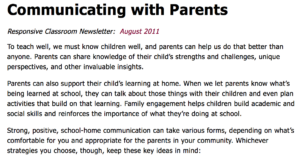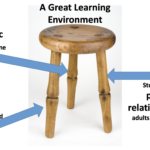Communicating with Parents
Parents can also support their child’s learning at home. When we let parents know what’s being learned at school, they can talk about those things with their children and even plan activities that build on that learning. Family engagement helps children build academic and social skills and reinforces the importance of what they’re doing at school.
Strong, positive, school-home communication can take various forms, depending on what’s comfortable for you and appropriate for the parents in your community. Whichever strategies you choose, though, keep these key ideas in mind:
- Start early, preferably before school starts.
- Communicate frequently, on a regular schedule, and in a consistent format (website, email, phone calls, note in Friday folders, etc.).
- Keep everyday communications brief, focused, and positive.
- Invite responses. Try to make it a conversation, with both sides listening and talking.
- Empathize, reminding yourself that all parents are alike in one way: They all want what’s best for their child.
Two-way communication with parents builds a firm connection between home and school. Aim to set a positive tone for this communication from the start of the year and then maintain it. Parents will appreciate your efforts—and you and your students will benefit immensely.
Adapted from the What Every Teacher Needs to Know series, by Mike Anderson and Margaret Berry Wilson
August 2011, Responsive Classroom Newsletter, Original Link: https://www.responsiveclassroom.org/article/communicating-parents
Mike Anderson is an education consultant who leads great learning throughout the United States and beyond. He is an award winning teacher and the author of many books. You can follow him on Twitter at @balancedteacher.





